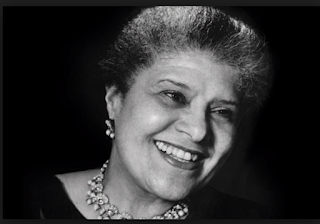Eslanda Goode Robeson was born in 1895 and died in 1965. Here is her biographer's [Barbara Ransby] short description from an interview at Democracy Now (link below): "She was initially a scientist and a chemist. She met Paul Robeson in 1919, and they married in 1921. She became the architect of his early career. She was his manager and publicist and confidante and coach. But then she decided to really forge a more independent career of her own, and she was a journalist, an anthropologist. She authored or co-authored three books: one about her travels in Africa, another one with Pearl Buck in 1949, and another one was a biography of her husband Paul. So she was an intellectual. She was an anti-colonial activist. She was an anti-racist. She advocated women’s rights. And she allied herself with a world anti-capitalist movement at a time when that was very costly to do so."
I have wanted to share the book that Eslanda wrote - African Journey - because she gave my parents a copy with an inscription for my father. "For Charlie Kramer with thanks for so cheerfully accepting me as one of the guys. Gratefully, Eslanda Good Robeson."
This and the photo of Paul - inscribed to me and my sister "To Anne and Joan, You have a wonderful dad. Paul" are among my greatest possessions. An autographed photo of W.E.B. DuBois is another.
From a review of the biography of Eslanda Robeson by Barbara Ransby we learn this about her middle class and educated family and their influence on her: "Ransby identifies Eslanda’s grandfather and mother also named Eslanda, as influential figures in Eslanda’s early life and later political positions. Eslanda’s grandfather Francis Lewis Cardozo, a prominent South Carolina politician during Reconstruction and later a respected educator in Washington DC who advocated for blacks, was a significant symbol of race pride for Eslanda. Eslanda Sr shared left-leaning views and in the 1910s volunteered with black socialist internationalist Hubert Harrison’s newspaper The Voice and supported female suffrage groups. By detailing Francis Cardozo and Eslanda Goode's political pasts Ransby helps to demonstrate that the ideological commitments Eslanda took up later in life built on a family tradition of leftist activism."
Eslanda spoke and wrote about Africa, particularly in order to dispel the ridiculous stereotypes that our country exposed. She talked about Africans as intelligent, and beautiful, and brilliant in a way that went against the views of the time, with African Americans themselves not embracing their fabulous heritage. She was so ahead of her time in so man ways. And courage -- her courage was striking given the amount of repression she and Paul suffered.
Her international solidarity was extensive, including friendship with Nehru and his family. Barbara Ransby: "She had studied at the London School of Economics. She studied with Bronislaw Malinowski. Jomo Kenyatta, the future leader of Kenya, was one of her classmates, as were a number of future African independence leaders. And she talked about Kenyatta’s influence on her, piquing her interest in Africa and the complexity of Africa as a continent, and the very specific cultures of southern and East Africa and Central Africa. So she traveled to Africa in 1936 to do her anthropological work in part because she disagreed with some of the racist comments and assumptions that she found among her classmates and some of her professors at LSE. So, she wrote of the connectedness between African Americans and Africans. She said Europeans have the old country, and sub-Saharan Africa, even though it’s not a country, it’s our old country—plural, our old countries, if you will. So she wrote extensively about that."
Eslanda Robeson was called before the Senate Internal Securities Committee, McCarthy's committee in the Senate. She testified separately from Paul and it was about her book that they were interested. Indeed, she was seen as subversive for calling for African independence.
Not hard to imagine how racist the committee was towards Mrs. Robeson. "Did you write the book by yourself?" Barbara Ransby: "And she said, you know, "I’m perfectly capable of writing a book by myself. I take offense at the question." And she then flipped the questions that the committee was asking her and asked them, you know, what was their legitimacy? How did they dare ask her these questions? She invoked the Fifth Amendment against self-incrimination, but she also invoked the 15th Amendment, which is the right of blacks to vote. And the reason she invoked that is to point out that some of the Southern senators who served on that committee came from states where black people could not vote. And so, she really tried to use that testimony to make her own political statements rather than to cow and to be a victim of McCarthy’s inquisition. Afterwards, he sort of—McCarthy kind of glared down at her and said, "If you were a man, I would hold you in contempt."
Sadly Essie (Eslanda) Robeson died too young, before her husband who would mourn for her the rest of his life. She was his rock, his spirit support, his agent, his equal of course. He found life very hard after she was gone.
Paul, Eslanda, and Paul Jr.
Helpful Links:
Democracy Now special program - Remembering Eslanda Robeson-- http://www.democracynow.org/2013/2/12/remembering_the_overlooked_life_eslanda_robeson Video of same program Democracy Now - https://www.youtube.com/watch?v=K3Ezymqbw-M
Eslanda Good Robeson Facts - http://biography.yourdictionary.com/eslanda-goode-robeson
Eslanda Goode Robeson - Reviews in History of Ransby book -- http://www.history.ac.uk/reviews/review/1527
Black Agenda Report review of Ransby book -- http://www.blackagendareport.com/content/eslanda-large-and-unconventional-life-mrs-paul-robeson-review
Digitizing Diaspora - Congo Diary: Eslanda Robeson's Second African Journey -- http://digitizingdiaspora.com/neatline/show/eslandarobesontravels
Buy the book African Journeys at Abe Books -- http://www.abebooks.com/African-Journey-Robeson-Eslanda-Goode-1896-1965/320927964/bd







No comments:
Post a Comment